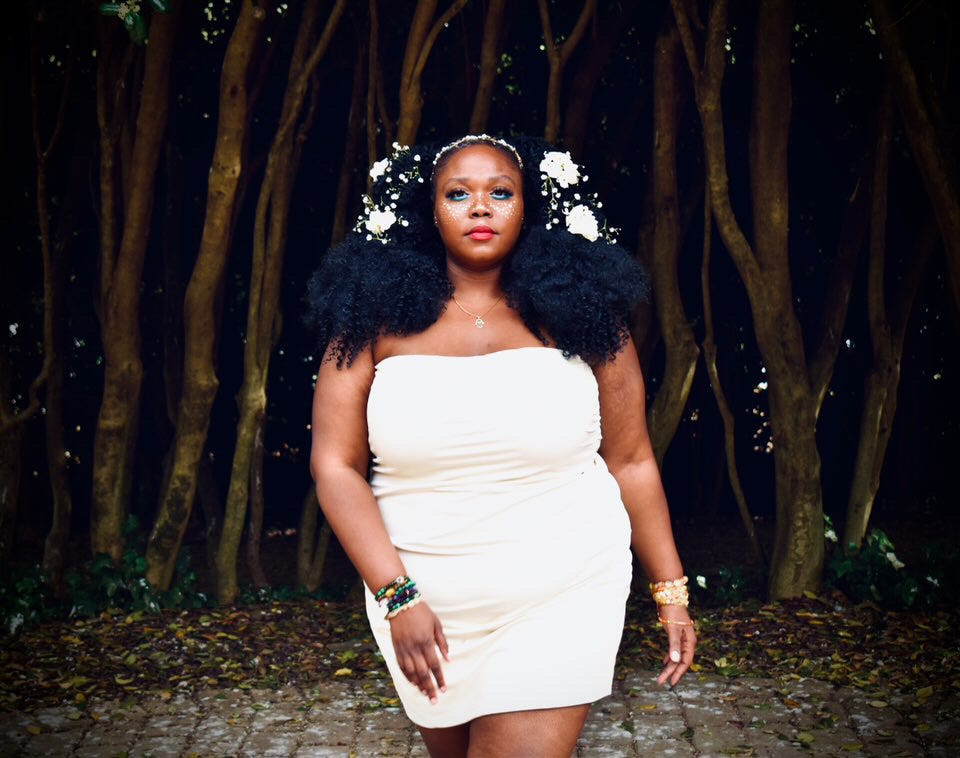Originally from the heart of Mobile, Alabama, the dynamic writer Sade Sade has been using spoken word to amplify truth in the Carolina poetry scene. With a voice that commands attention and lyrics that inspire action, she weaves together womanhood, Black cultural pride, and spiritual grounding in every piece.
Overall, her poetry is an extension of her commitment to activism and community reform. Her main focal point is to create a space for all individuals and artists to coexist by encouraging people to welcome their individuality, enacting the phrase “Collaboration Over Competition.” As spoken word continues to thrive in today’s cultural landscape, Sade stands at the forefront as a voice of both resistance and restoration. In this conversation with Jahmed Williams, she opens up about her creative process, her purpose, and the path she’s paving for the future.
Interviewer: How has your background influenced your pen?
Sade Sade: “Well, I’m from the Deep South—specifically, Mobile, Alabama, which is right in the middle of the Bible Belt. So naturally, I have a deep spiritual element in my pieces. In fact, my first album was called Genesis. I grew up around my grandmother, who lived to be 100 years old. So, a lot of the things I’ve learned in life, I can say my granny was responsible for, just by being steadfast in who she was as a person. She always said, “What’s in your heart will echo”.”
“So I kind of take that approach to spirituality, except I write about things from my own perspective.”
Interviewer: How would you describe your poetic style?
Sade Sade: “I would say my poetic style is very reflective, spiritual, and empowering. I have a sweet voice, but at the same time, it holds power. I’m an assertive person, and it shows within my poetry.”
Interviewer: Walk us through your writing process. What does your creative space look or feel like?
Sade Sade: “I joke a lot that my writing process is like building a house. First, I write out everything I have to say, and then I’ll go back and add the colorful language, illustrations, and metaphors. I believe it’s really helped me elevate my writing because I used to be a first-draft kind of person. However, as I continue to grow, I understand the importance of editing.”
Interviewer: What emotion do you find yourself writing from the most?
Sade Sade: “Grief and self-awareness. The more that you learn and grow about yourself, there are parts of you that you do have to lay to rest. It’s all about self-actualization for me—whether that be relationships, friendships, work, whatever. There’s a lot of self-awareness and reflection that goes into it.”
Interviewer: What role does vulnerability play in your work?
Sade Sade: “Vulnerability is a very hard emotion to show people because, truthfully, I don’t know the people sitting in the audience. However, I’m working on opening that part of me up. I used to do a lot of empowerment or erotic pieces because I wasn’t fully comfortable being vulnerable with others.”
“However, the more I heal, the more I’m willing to write about those experiences. I never write about the things I am currently going through because if someone were to ask me for advice regarding how I got through that specific battle, I wouldn’t be able to help them—because I’d still be going through that battle myself. I’d never want to be in a position where I couldn’t help someone who needed it.”
We’ve witnessed the depth of SADE SADE’s journey, how her voice emerged from grief, growth, and spiritual grounding. Now, we shift gears and talk about where her creativity is taking her, and how she plans to continue turning her voice into vision.
Interviewer: Do you write to be heard or to be understood?
Sade Sade: “Neither. Because the pieces I write are very intimate to me. I write for release. I write about things I’m not ready to share with other people. Sometimes, I even write from a place of anger, and I don’t want my words to cut anyone who may be sensitive to that. My ultimate goal is to be a lighthouse for other people.”
Interviewer: What poets or people have shaped your voice?
Sade Sade: “On a personal level, I’d say my grandmother and dad for sure. Also, my poetry friends back home in Alabama who were a part of this organization called Halo City, because they pushed me into being the poet I am today. I’ve gained inspiration from women like Sade, Jill Scott, and Janelle Monáe as well, because they’re unapologetically themselves. And being unapologetically me is something I always strive to be.”
Interviewer: What’s something you’ve unlearned as a poet?
Sade Sade: “Not that I’ve ever tried, but I’ve learned that I don’t have to sound like anyone else. When I first moved to Charlotte, I noticed that the city was more of a slam scene, but that’s not my energy. I’m silly, I’m cool, and I’m playful—and that is reflected in my poetry. That’s what makes me me, and I don’t have to be like anyone else.”
Interviewer: What’s the future for you look like?
Sade Sade: “I want to be the best poet in the world. But poetry is just one avenue—I want to explore other areas of creativity as well. There’s a quote that says, Being multifaceted is honestly an expression of the essence of God. If you want to do multiple things, pray for the discernment and wisdom to know what to do. Essentially, poetry is one of the many creative avenues I have, and the goal is to complete any avenue that can get me paid by just being myself.”




